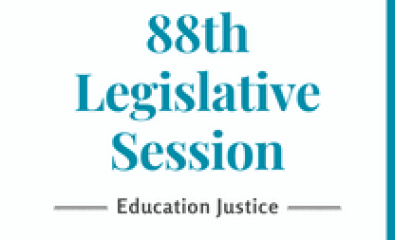
Education Justice & The 88th Legislative Session
As we enter the 88th legislative session, Texas Appleseed will be focused on encouraging the Texas Legislature to adequately support public school students. Texas Appleseed aims to focus our legislative priorities on issues of educational inequity and imbalances that have existed for years but exacerbated by the pandemic and recent school shootings. Texas Appleseed’s goal is to utilize our connections with community organizations, schools, teachers and students to cultivate a policy perspective that fosters safe and supportive environments where all students can thrive, regardless of race, income, background or zip code. Going into this upcoming session, Texas Appleseed’s legislative priorities focus on the whole student by steering away from unnecessary school hardening and discipline and encouraging funds to go to mental health support and trauma-informed resources.
For months following the tragedy at Robb Elementary School in Uvalde, the public received more information — with each passing week — about the inadequate police response to the active shooter. Based on empirical and anecdotal data, we know that school policing simply does not translate into true school safety. Given the failure of hardening measures passed and funded during the 86th session to prevent the tragedy in Uvalde, we will encourage policy makers to refocus on true school safety by supporting mental health resources and opposing more funding for school police and invasive surveillance of young Texans.
Following up on the success of HB 674 (2017), we want to highlight innovative local programs that are pushing back against a deeply entrenched culture of zero tolerance school discipline policies. We will urge legislators to explore alternatives to exclusionary discipline — one alternative is the Dallas ISD reset room program, which can be a model for other districts across Texas. By identifying and implementing alternatives to suspensions and expulsions, the Texas Legislature will be able to produce more equitable classroom settings that are truly focused on addressing the learning loss that occurred across the pandemic.
For the past few legislative sessions, Texas Appleseed has highlighted that no independent school districts meet the recommended ratios of school counselors, psychologists, and social workers to K-12 learners. With a recognition of the tremendous healing that is required for young Texans as the coronavirus pandemic continues and other stressors that children experience, we will urge legislators to fund school-based mental health professions and prioritize funding streams for more social workers, psychologists, and school counselors.
Although billions of dollars have flowed to Texas from the stimulus packages of the Trump & Biden Administrations, we understand that a good deal of money remains on the table for pandemic relief. We will urge legislators to direct that money toward TEA and local education agencies to support trauma-informed resources, mental health services and supports, and the implementation of restorative practices.
Texas Appleseed developed the Education Justice Project in 2020, following decades of work regarding the school-to-prison pipeline, to continue and expand the organization’s long standing focus on justice and the best outcomes for children in Texas’ K-12 school system. In the last two years, we deepened our relationships with base-building organizations across Texas that organize parents and young people. We have been honored to stand with young people, parents and educators in demanding more holistic learning environments for K-12 learners. Data over the years has shown the harms of exclusionary discipline and school policing, and we will continue to fight for equitable schools in Texas so that all students can access equal educational opportunities.